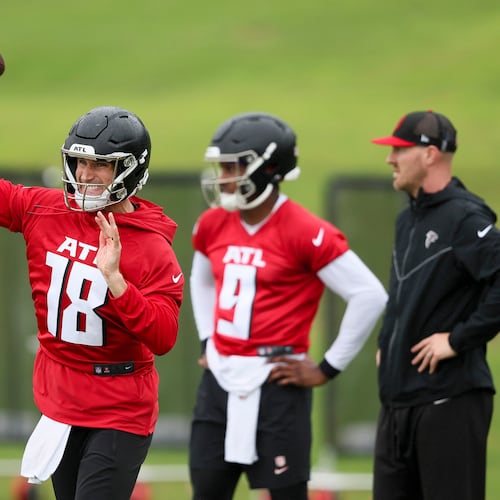Football sportsmanship should have drawn flags this weekend.
From the high school level to the pros, highlight shows featured men in positions of leaderships behaving badly or being badly mistreated.
A Georgia high school coach was injured during a fight between his and the other team. A University of Georgia assistant coach got into a screaming match with the opposing head coach. A Detroit Lions coach chased down the opposing coach following their game because he felt he was treated disrespectfully. The situations were embarrassing for the coaches, teams, schools and franchises, and the sport. There were potential penalties as league offices reviewed the incidents.
It’s not a new phenomena. Ohio State coach Woody Hayes punched Clemson player Charlie Bauman in the Gator Bowl in 1978 in one of the more famous examples of emotion run amok that’s still referenced today. Yet separate incidents this weekend on the three highest levels of football might provide a new unfortunate benchmark for bad behavior. At the same time, they have resurrected the importance of coaches setting a good example.
“Everything we say is potentially life-changing,” Georgia State coach Bill Curry said. “A lot of times we are the only adult male role models that this generation has ever had. They are going to try to be like us.”
Curry said today’s violent culture has created situations that shouldn’t exist: A person is insulted and feels the proper thing to do is react, which is what occurred after the San Francisco 49ers defeated the Lions. The proper thing, the responsible thing, that wasn’t done by a few coaches this weekend, was to ignore it. To do otherwise, Curry said, might result in a regrettable situation.
“If the coaches are sparking stuff like that, it’s only a matter of time until someone gets hurt badly,” Curry said.
Former Falcons coach Dan Reeves learned a long time ago that graciousness after victory or defeat was necessary. When he coached the Broncos in the early 1980s, Reeves declined to shake the hand of Kansas City coach John Mackovic after a meaningless game late in the regular season. The Broncos already had clinched the division. The Chiefs were playing out the string; Reeves remembered Mackovic saying as much earlier in the week. However, once the Chiefs were winning late, Mackovic began calling timeouts in an attempt to run up the score. Reeves elected to avoid the post-game tradition. He soon realized that he sent the wrong message.
“I knew that was wrong,” he said. “It wasn’t what I was trying to teach my children.”
Former Georgia coach Vince Dooley agreed with Reeves that it can sometimes be difficult to control your emotions, particularly when there’s no cooling-off period between the end of the game and the post-game impromptu meeting.
Consider, when the whistle blows, the head coach will hand his headset to someone and jog to the middle of the field. During those few seconds, the coach thinks about what went right and what went wrong during the game, gets pulled aside by TV and radio crews for post-game interviews, and tries to make sure players behave. As they try to find the other coach in a sea of people, most of these men are calm, yet sometimes a few aren’t.
It can be a difficult situation; however, Dooley said circumstances don’t excuse a lapse of judgment, particularly from the head of the program.
“Coaches are held to a higher sportsmanship responsibility than their players, who are themselves held to a high standard,” Dooley said, adding that’s how it should be.
Dooley couldn’t remember being involved in any post-game incidents, saying that he tried to rise above those kind of things. He constantly stressed to his players to do the same. The requirements of the game, however, can make that a challenge.
“Sportsmanship will be challenged periodically,” he said. “As long as you stay in a game that’s that physical and that emotional, you will have those from time to time. They have to be addressed.”
Atlanta Falcons coach Mike Smith said he doesn’t have a problem letting go of the emotion.
“When the game is over and [the clock] goes to zero, you go over and shake the hand, win or lose,” he said. “Then you go to the locker room and move on to the next one.”
Moving on can be a problem for some. It can be difficult on the high school level because there aren’t all the superfluous personnel standing on the sidelines, as in college and the pros, who can cool tempers. Factor in the intensity of the rivalries and frequent blowouts, and situations can quickly become toxic.
Dave Hunter, formerly a state-championship coach at Brookwood, was involved in a fracas against Riverdale and was somersaulted into the air in his first game at the school in 1987. Several players were involved from both teams and the game was suspended with a few seconds remaining.
Hunter said it didn’t get any worse because he and Riverdale coach Bill Kennedy set examples for their players by jumping in and diffusing the situation, rather than inflaming it.
“[The] thing that bothers me most, and this is at any level, is the integrity of the game,” Hunter said. “Any coach, because he is the leader of the team, has to know that he’s a representative of the integrity of the game. [The] safety of the kids and integrity of the kids have got to come first in the coaches’ eyes.”
About the Author
Keep Reading
The Latest
Featured

